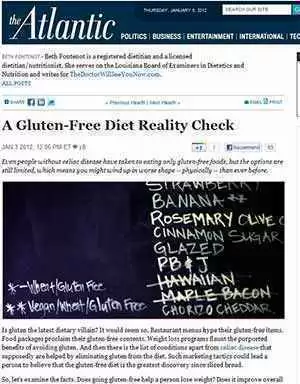
Celiac.com 05/12/2018 - Dear researchers/scientists at NIDDK: RE: Misinformation on your website?
I am encouraged that you have information about celiac disease on your website (Provider Points: Testing for Celiac Disease). My wife has had celiac disease (CD) for more than 35 years and we always welcome more public/professional exposure for this perplexing condition. I'm a gluten-sensitive-patient advocate and concerned that your information does not appear to be supportable by laboratory science. (Yes, I saw the references and the reviewers—very prestigious literature and referees for your document.) Let's review the information from an accountant's perspective.
Celiac.com Sponsor (A12):
Before we get into the details of your site, I must mention that I was a medical laboratory technologist in California for 15 years and am quite familiar with the issues that you discuss related to laboratory testing. I was actually working in the lab years ago when the PSA (prostate-specific antigen) was proclaimed the ultimate test for prostate cancer. Now the U.S. Preventive Services Task Force (USPSTF) recommends against PSA screening. Because of this reversal of support for the PSA and other similar tests that were first introduced with blazing reviews throughout the years, I take a skeptic's view whenever I see amazing claims about lab tests. I have read much of the CD research literature and have not changed my cynical ways after reviewing the astounding claims for the blood tests and the biopsy in preparation for writing my book, Celiac Disease & Gluten Sensitivity: A Troubled Past but a Promising Future.
Before we put the accountant to work, I want to point out that you have taken the safe road when stating that, "For accurate diagnostic test results, patients must be on a gluten-containing diet." One reason you made that statement is because the news sources certainly give us the impression that an expanding portion of the population is attempting the gluten-free diet (GFD) first, before any testing. Many patients would therefore need to return to a gluten-containing diet. Most major celiac organizations designate a certain number of weeks or months for a person to be on this diet in order to get the accurate results to which you refer. I assume you are aware that no one really knows exactly how long patients must consume gluten to ensure high rates of accuracy for the blood tests. You will find a variety of time spans on the various university and public advocacy websites.
Since yours is a Provider Points site, it would seem prudent for you to explain to the providers that the exact length of time is unknown—therefore the doctor would need to take his/her best guess because each person is unique. It's worth noting that currently most doctors know little or nothing about CD and its myriad ramifications. This is my first point. Before we stick that needle in the patient's arm, we may already be in error by specifying a certain time span for the gluten-containing diet and therefore introducing inaccurate results for those patients who did not perform within the limitations. And neither you nor the providers know how large, or small, that number may be.
Now the accountant can clock in. You seem to favor the tTG test as the best. You say that it has a sensitivity of more than 90% (very few false negatives) and a specificity of more than 95% (very few false positives). As you know, those are remarkably good numbers for any lab test (not to mention the EMA, which Dr. Green says is approaching 100% accuracy). Let's break those figures down. You assert that 2–3% of celiac patients have selective IgA deficiency. Are those people included in the 90/95? I assume they are, since we can't know who these patients are until they're tested. If they are included, then those 90/95 numbers are even more amazing, because we now have a small (but significant) percentage of cases who will immediately show up as false negatives.
Let's move to the other group that you've stated might not be accurate because the "tTG and EMA tests may yield false negative results"—young tykes. Again, every individual is unique, and to assume that your 18-month cutoff age will work for every child is pushing the limits. I noticed you also did not include the elderly here, although the two clusters have similar problems—immune systems that are immature (kids) or faulty (seniors). So both ends of the age continuum may show false negative results for the tTG.
In fact, it wouldn't be a scientific stretch to expand this idea further, because we know there are millions worldwide within these age specifications that are immunocompromised due to undernutrition. When you add the age factor plus the nutrition factor together in one patient, he/she is even more unlikely to be able to produce a robust autoantibody response, and therefore would show up as a false negative. I'm not sure the accountant can keep track of these numbers—they keep adding up and making those 90/95 values seem like a dream.
I've already introduced the undernutrition topic, so let's throw in a few million people who are undernourished, and therefore may be immunocompromised but are not at the extremes of the age spectrum. Let's now go beyond the undernutrition group and identify more of the immunocompromised. That list is quite long, but here are just a few examples of patient conditions/illnesses: HIV/AIDS, alcoholism, diabetes, corticosteroid use, and immunosuppressant use.
There are two recent developments that help answer a question that may be rolling around in the back of your mind, "How many more hours do I need to pay this accountant before she's finished calculating the total number of patients who may show false negative results on the CD blood tests?" The answer is, "You're going to need to her full time."
First, new research on patients' responses to vaccines (International Journal of Obesity, "Obesity Affects Influenza Vaccine Response", October, 2011) suggests that obesity may impede a person's immune system such that they may not be able to produce sufficient antibodies as would normally be expected: another subset of the population who may show false negatives when tested for CD. This is preliminary research which will be further explored because the finding is critical to the vaccine industry. If true, can you imagine the number of people added to the accountant's ledger in the U.S. alone?
Second, on page 27 of a monograph titled, 21st Century Medicine: A New Model for Medical Education and Practice, by David Jones, MD, Laurie Hofmann, MPH, and Sheila Quinn, the researchers describe the affect that various influences may have on gene expression.
"The evidence clearly reveals that each patient is a unique individual—one whose gene expression patterns are constantly in flux and whose complex and ever-changing response to treatment, environment, and lifestyle will challenge physicians to listen differently, see differently, and respond differently than taught by the linear model of acute care."
That statement allows us to question the accepted position of the CD community which clings to the principle that once the celiac genes are turned on, they stay on forever—theoretically at the same level of expression—such that once a patient becomes sensitive to gluten, that patient is forever relegated to a gluten–free diet.
The authors' statement adds support to the controversial concept of "transient celiac disease," which suggests that a person may have a full blown case of symptomatic CD with all the tests showing positive, and then at some time later in life, the gene expression modulates and the person either becomes less sensitive to gluten or even may return to a totally normal diet without any untoward consequences. The patients' blood tests and biopsies would also potentially resort to normal. If you decide to read my book, you will observe that we already have documented cases of blood tests that reverted back to normal in people who had been officially diagnosed with CD but continued on a normal diet (fluctuating antibody levels).
I think you get the picture. All of the aforementioned patients may show up as false negatives; I suspect the accountant can give you a strong estimate as to how accurate the 90/95 numbers are. Since you have only briefly discussed the biopsy on these web pages, I won't critique it, beyond stating that using that test as the "gold standard" also pushes the limits of credibility. If you would like to read my ebook it's on Amazon.com. It clearly identifies the shortcomings of the testing suggested for CD using accepted research and common laboratory knowledge.
I am, as you are, a gluten-sensitive-patient advocate, but misinformation can be just as bad as no information. I'd love to have a professional conversation with you about the issues I have raised.
Thank you for your time,
Gordon Heinrichs, DC
P.S. I am retired from seeing patients and write about gluten-health issues as a hobby and passion.










Recommended Comments
Create an account or sign in to comment
You need to be a member in order to leave a comment
Create an account
Sign up for a new account in our community. It's easy!
Register a new accountSign in
Already have an account? Sign in here.
Sign In Now